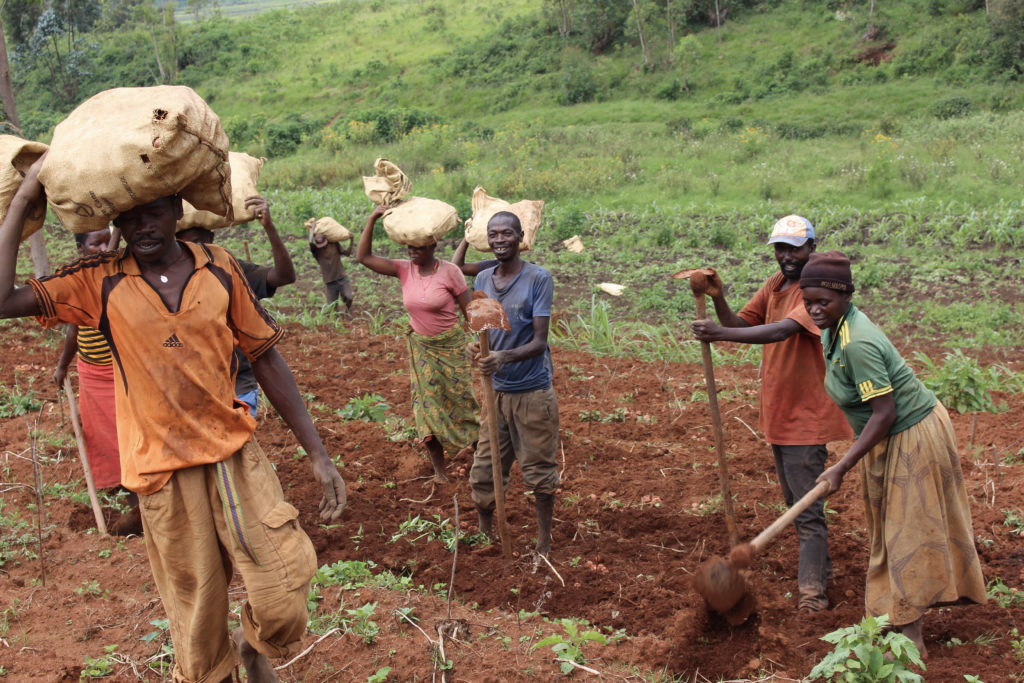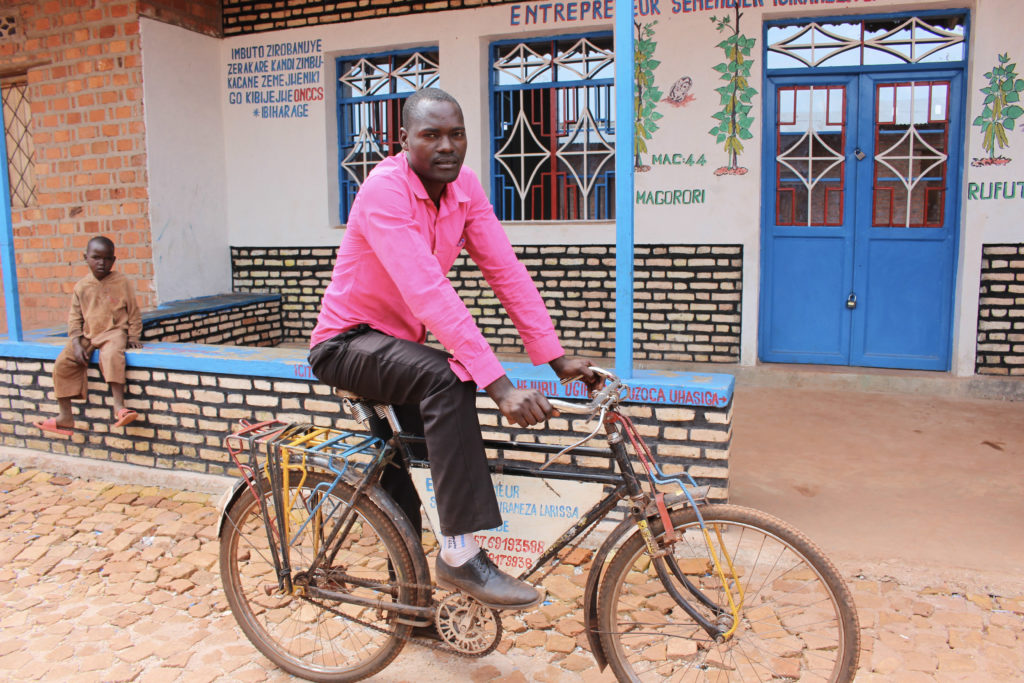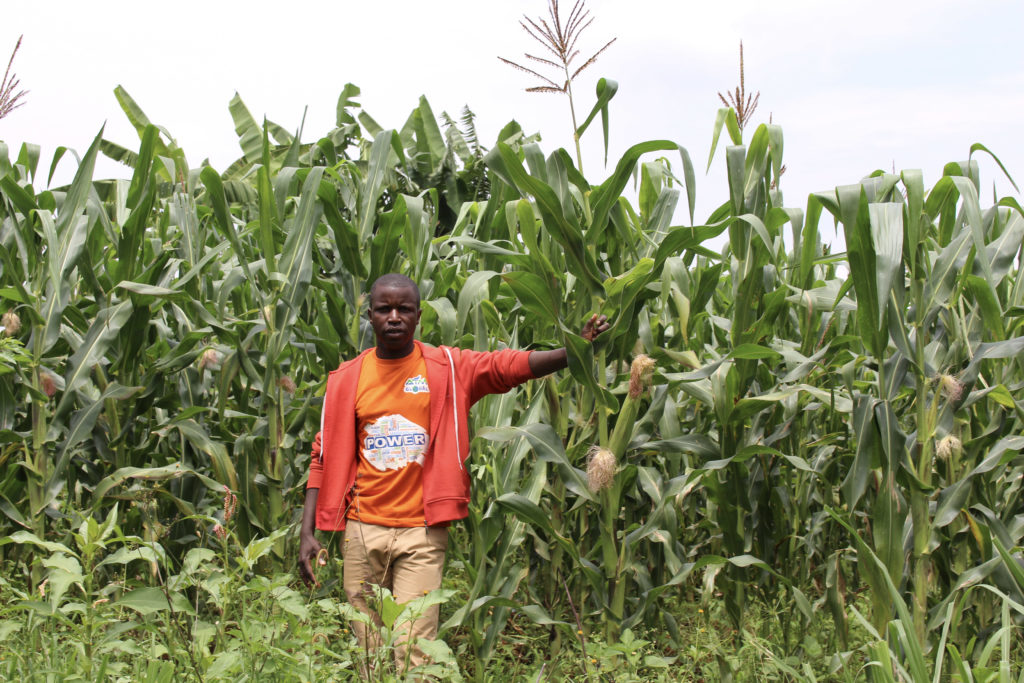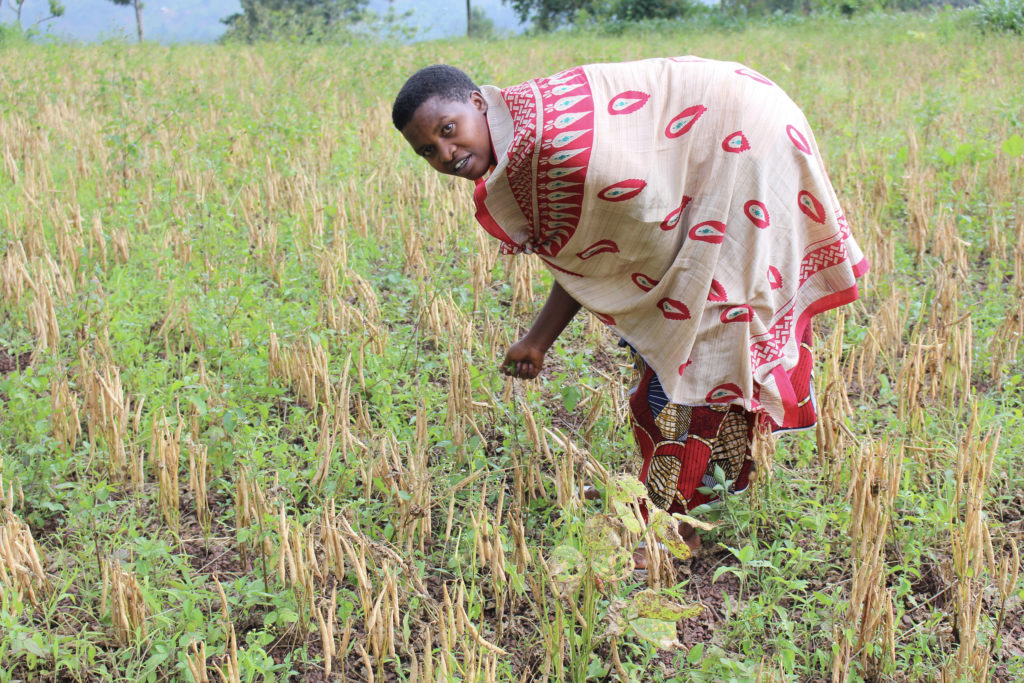
With locally produced certified seeds, poor yields are a thing of the past!
Mrs. Joseline Butoyi is a farmer from Rwibaga-Mujejuru hill in Bujumbura Province, Burundi. Like many farmers in her village, she did not know how to increase her potato crop yield. Her crop, cultivated on less than a quarter of an acre, often failed to thrive. The potatoes were susceptible to disease, and the seeds did not germinate well. The seeds that Butoyi purchased were from the local market, but they were not certified.
“Previously, I grew non-certified potato seed with poor yields at harvest time. I thought all seed was productive at the same level, and I found certified seed to be expensive. So, I thought it was unnecessary.”
Poor-quality, or “off-the-shelf,” seed is common in Burundi. Many farmers are not aware of or do not have access to certified seed. Farmers must travel long distances and pay more to obtain certified seed.
Butoyi learned about the importance of using certified seed after meeting the clients of Apollinaire Niyusure, a seed contractor. When Butoyi began using the Ndinamagara variety of certified potato seed, she had an impressive potato harvest.
“They drove me to where their demonstration fields were. They were really good fields compared to my own field. So, after being convinced, I went to the same contractor and bought 50 kg of certified seed. I sowed the seed, and surprisingly, the quantity harvested was far superior to the crop I harvested before, around 700 kg. Since that day, I only use certified seed that I buy from the seed contractors.”
Butoyi obtained her seed from Blaise Manirakiza, Niyusure’s seed sales agent. She now earns a small income from her potato crop yield, which helps with family expenses.

“Last year I sold more than 500 kg of potato seed, and I had a great profit. I have been recognized in my community, and I plan to expand my customer base and my seed business in the future.”
As of 2019, 60,973 men and 46,339 women have gained access to certified seed of high-performance potato, maize, and bean varieties through IFDC’s Private Seed Sector Development (PSSD) project.
The PSSD Project’s Decentralized Approach
The PSSD project uses a decentralized approach to develop the seed sector, with the producers and sellers of certified seed located at the village level, which means that seed is available in even the most remote villages. This approach, the “Commercial Seed Sales” model, is characterized by:
- Financial and technical support to local certified seed producers, who sell directly to farmers.
- Capacity building for seed producers to set up micro-demonstration plots and conduct field days in remote communities, facilitating access to information on good agricultural practices (GAPs).
- Establishment of seed outlets in remote villages and central markets to provide access to seed.
- Recruitment of mobile sales agents, who travel to remote villages to sell certified seed and provide information on GAPs.
- Sale of seed in micro-packages that are labeled with a certification mark to facilitate financial access and ensure seed quality.
- Promotion of certified seed through local radio stations to create demand.
- Development of company brands to build trust between seed producers and consumers.
“Last year I sold more than 500 kg of potato seed, and I had a great profit. I have been recognized in my community, and I plan to expand my customer base and my seed business in the future.”
Farmers are not the only ones who benefit from certified seeds; the producers and sellers of certified seed have seen their incomes increase as well.
Niyusure, the seed contractor who sold the certified potato seed to Butoyi, has seen the positive impact that certified seed production can have in a community.
“The seed multiplication activity allowed me to understand the seed sector, to form a relationship with financial partners and technical institutions. I have created a multiplication center for potato, bean, and corn seeds. I have also created jobs, especially for women and young people. The money they earn allows them to meet their needs, such as food, clothing, schooling for children, and even the purchase of quality seed.”
Workers employed by the seed producers also benefit from certified seed use. To date, seed companies have employed 32,287 day laborers for activities ranging from production to post-harvest activities. In addition, seed producers have created 320 permanent jobs.
According to stakeholders, the most important factors in increasing farmer awareness of the availability and benefits of certified seed were visits to the micro-demonstration plots (75% of respondents), followed by certified seed promotion by sales agents (59%) and certified seed promotion on radio programs (20%).
Nkeshimana Nestor, a sales agent for a hybrid maize seed company, noticed an increase in sales over the course of a year due to micro-demonstration plot visits. “The sale of hybrid maize seed from our company has increased from 1,250 kg in 2019 to 5,000 kg in 2020, thanks to sensitization through micro-demonstration plots and visits, as well as through the churches. At first, we were afraid, but with this marketing we have sold all the seeds we expected.”

Micro-demonstration fields increase sales by showcasing the value of certified seed and allowing farmers to learn GAPs. The demonstration fields have had a noticeable impact on local farming practices. Sibomana, an employee of a Burundian non-governmental organization (NGO), explains: “Thanks to the activity during the field days, the surrounding population of the activity area is starting to practice the new farming methods and buy improved seed from seed entrepreneurs. An increase in yields has been observed among those who participated in the visits and who bought certified seed.”
PSSD partner seed producers have installed 9,931 demonstration fields and trained 54,264 farmers on GAPs, including 42,211 women. Having private contractors install demonstration plots has increased trust between farmers and seed producers and decreased the cost of farmer training. It costs private sector partners between $5.87 and $9.26 to train farmers on GAPs.
According to farmers and seed consumers, access to certified seed was most improved by micro-demonstration plots (81% of farmers), proximity to stores (52%), sales agents (22%), and micro-packages (7%).
“Being convinced by the demonstration plots and the extension agronomists, I bought the potato seeds of the Ndinamagara variety from the seed contractor and sowed them using good agricultural practices,” a farmer from the commune of Mugongomanga said.
They also discussed the benefits of the improved varieties of certified seed, such as increased profitability, yield production even in adverse growing conditions, pest and disease tolerance, and better marketability with higher prices for crops. This has had a significant impact on household yields, income, and nutrition.
As one farmer noted, “For the first time in my life I was able to produce three big bags (300 kg) of beans with 50 kg of Musole seed. I gave some to my family and sold the rest. I also learned that this variety is biofortified, which could help my wife who suffers from anemia.”

“The yield has been good because, with the 10 kilograms of bean seeds that I bought, I had a harvest of 120 kilograms, whereas before I used seeds from the market and only harvested 60 kilograms of bean,” Jocelyne Mukagatare, a farmer in Kirundo province, explained.
The high yields and resulting benefits, including increased household income and nutrition, strongly indicate that farmers will continue to buy and use the certified maize, potato, and bean seed next season and may even increase their acreage.
“I had an impressive harvest! The large potatoes were consumed while the medium sizes (120 kg) were kept to be used as seeds during the next season because I am confident. There are two neighbors, newlyweds, who came to buy Bikorimana (30 kg) and Ndayishimiye (25 kg) in October 2020. Following the good production, I plan to increase the area to plant at least one-quarter hectare,” said a farmer from Bururi Province.
Most of the farmers who bought certified seed continue to use it and even encourage their neighbors to do so. “I appeal to farmers who have not yet had the opportunity to use certified seed to try it because it is more profitable and the difference is remarkable, ” stated Immaculate Kabaganwa, a farmer from Kirundo Province.
The PSSD project is working on several other aspects of the seed sector in Burundi, such as regulating certification, supporting new seed enterprises, and strengthening linkages between research and seed producers, sales agents, and farmers. Much work still must be done to scale up this approach.
“I have seen the change that certified seed has made on my hill. I encourage the diversification of improved seeds to produce and sell and support us to access other agricultural inputs,” a female farmer from Bujumbura Province declared.


PSSD is implemented in partnership with KIT Royal Tropical Institute and is supported by the Dutch Ministry of Foreign Affairs under Dutch development policy.




